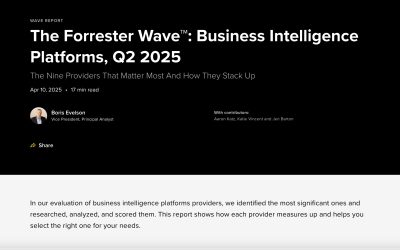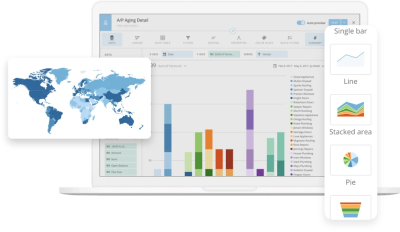Choosing between traditional and custom BI applications
Data is everywhere, but most people don’t know what to do with it. The business intelligence (BI) industry has seen companies and enterprises spend large amounts of money on systems that promise to deliver insights that will help them make better business decisions. But the reality is that many businesses are still struggling to unlock the potential of their data for competitive advantage.
Finding the right solution for your needs as well as the needs of stakeholders, clients, teams, and other interested parties in your data sources requires careful consideration. Maybe an off-the-shelf solution will work well for your company, but in many cases, a custom application is a better choice.
What are BI applications?
BI applications are software tools that help business managers and executives make better decisions. They are designed to assist you in understanding your business better.
These tools can be used by businesses of any size, including large companies with thousands of employees or small businesses with just a handful of people on staff. BI applications work in any industry. They’re not limited to one niche but rather apply to all industries equally.
For the most part, BI tools use dashboards and reporting that include data visualizations to convey complex ideas in an easy-to-understand method for any viewer.

Traditional vs. custom applications
Traditional applications are off-the-shelf software programs that have been built by developers. They’re usually available through stores like Apple and Microsoft or as part of a subscription service like Salesforce. They can be modified to some extent, but most of their features are fixed when you buy them from a vendor.
Custom applications are built specifically for your company. They’re designed with your business needs in mind. This involves asking questions like the following:
- What kind of data do you want to collect?
- How often do you need it organized and reported on?
- Who should see those reports (and where)?
- What format or technology needs to be integrated?
And so on.
Customized applications allow you to configure everything about the software so it meets all of those requirements perfectly.
Low-code/no-code solutions
If your company is pursuing a custom application, you can engage a software development company to create a project from scratch using code. These are programmable solutions that require engineers and experienced individuals to complete the project.
Today’s marketplace also features low-code/no-code solutions as well. These platforms provide you with an intuitive drag-and-drop interface that allows you to build custom applications in as little as one day. These powerful software platforms enable businesses of all sizes to quickly build robust applications that can be used across an organization by non-technical users with no coding experience.
Key benefits of custom BI applications
Custom business intelligence applications provide a variety of benefits. We highlight just a few of them below:
1. Tailored solution
Your solution will be tailored specifically for your company. It will be built to your specifications and will fit your business model. Your solution will also be built with a deep understanding of the market you operate in, as well as the competitors that may be identified as threats.
2. Adaptable
Custom applications are designed to meet your industry, business, and market needs. If there’s something that goes beyond what the standard features of off-the-shelf software can do, you can rest assured that a custom application will be able to address it and even add more value.
The best part about custom apps is that they’re designed to meet specific company needs in terms of data collection and analysis, as well as the scope of industries targeted by an organization. Therefore, companies with diverse operations will find this type of solution beneficial because it allows them to analyze their operations from different angles in order to find patterns and trends that may otherwise go unnoticed due to being buried within large datasets.
3. Compatible with your operations
Another thing to consider when getting started is whether your application will be compatible with your existing systems. No matter what kind of business you have, there are probably tools that can help automate some aspect of your operation. For example, if you run a restaurant chain with locations all around the country, then chances are good that there’s already an app out there that manages all those locations in one place. But by building a custom application, you can ensure that the software is compatible with the other technologies your business uses.

4. More secure
Custom applications are more secure because they are built to your specifications. You know what data you want, who needs access to it, and where it should be stored. You also know which users have access and how long their credentials will last. With generic applications, there is no way to ensure that the information is safe from hackers or cyber criminals because these systems were not designed for your specific data and users.
Securing custom applications is easier than securing generic ones because a developer has already gone through many of the steps necessary for security measures like encryption and password protection. It is also a more unique solution, meaning hackers haven’t had the chance to test it like they would with off-the-shelf applications.
5. Ownership of intellectual property
If you build a custom application, you own that intellectual property. If you have the skills to use a BI application, you can do whatever you like with it. You can change it, build on it, sell it, or use it in any way that will help your business grow. Once the custom application has been delivered to your business, it is yours and no one else’s. You don’t have to keep purchasing upgrades every year or using options that do not apply to your business.
6. Easy to use and integrate
A custom application will have a highly relatable user interface that speaks directly to the usage and needs of your organization. That reduces the need for specialized training because there are no “extra” services you have to be aware of when using them. Everything is streamlined to your particular business needs and challenges. That includes working with the processes and technology already in place for seamless integration.
These custom applications provide an intuitive, self-service experience for business users. You don’t need to be a technical expert or have special training. Users can easily find and interact with the data they need when they need it.
7. Easy to scale
The ease of scaling is another significant benefit of custom applications. With a purpose-built solution, you can scale to meet your growing needs with relative ease. You don’t need to hire additional developers or buy new hardware, and you don’t need to buy new software either—you just add more users as needed.
This applies to internal BI dashboards or external-facing solutions that work with clients. The goal is to create a custom solution that can be added or removed without needing much third-party support.
The importance of data quality
Data quality refers to the degree to which data is fit for use. Data quality is a complex concept that encompasses completeness, consistency, accuracy, and other characteristics. Data quality also has a direct effect on the value of business intelligence solutions.
To achieve optimal business intelligence results, it’s essential that you understand what makes great data quality so important—and then make sure your data is of good quality. Whatever your proposed custom application, you need a solution that takes into account the data lifecycle and flow of your unique business. You do not want to risk bad data or downstream issues later on because of a poorly designed custom application.
Conclusion
The above are just some of the many benefits a custom application can offer. It’s important to understand the difference between traditional BI solutions and custom applications, as well as which one will be best for your business. And remember, when it comes down to it, no matter what kind of solution you choose (traditional or custom), the most important thing is that it works for your needs.
Check out some related resources:

Domo Named a Strong Performer in The Forrester Wave™️: Business Intelligence Platforms, Q2 2025

Guide to Data Pipeline Design: Steps and Patterns






